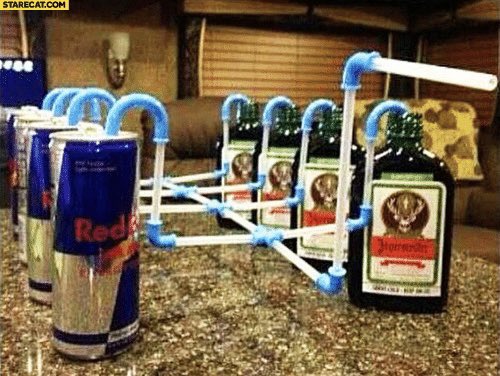Why does Red Bull own an F1 team?
Because the company — which sells $7B+ of energy drinks a year — is a pure marketing firm (outsources all production).
Its invested $2B+ into F1 but has gained multiples of that for the brand by "manufacturing history".
Here’s a breakdown https://abs.twimg.com/emoji/v2/... draggable="false" alt="🧵" title="collectie" aria-label="Emoji: collectie">
https://abs.twimg.com/emoji/v2/... draggable="false" alt="🧵" title="collectie" aria-label="Emoji: collectie">
Because the company — which sells $7B+ of energy drinks a year — is a pure marketing firm (outsources all production).
Its invested $2B+ into F1 but has gained multiples of that for the brand by "manufacturing history".
Here’s a breakdown
1/ Red Bull. Everyone& #39;s favorite concoction of sugar, B-vitamins, taurine and caffeine.
Today, it sells ~8B cans a year and is the market leader in what is a $50B+ energy drink market.
So, how is it *only* a marketing company?
Today, it sells ~8B cans a year and is the market leader in what is a $50B+ energy drink market.
So, how is it *only* a marketing company?
2/ Red Bull makes nothing. Production is outsourced to Rauch, an Austrian bottler.
The drink blend is not proprietary (vs. Coke, which has a secret recipe).
So it spends ALOT on marketing (~35% of sales) to differentiate the brand; way more than Coca-Cola (9%) and Pepsi (7%).
The drink blend is not proprietary (vs. Coke, which has a secret recipe).
So it spends ALOT on marketing (~35% of sales) to differentiate the brand; way more than Coca-Cola (9%) and Pepsi (7%).
3/ The Red Bull corporate structure was created by Dietrich Mateschitz and Chaleo Yoovidhya.
Mateschitz was an Austrian marketing exec who often travelled to Thailand. There, he fell in love with an energy drink called Krating Daeng (created by Yoovidhya, a Thai pharmacist).
Mateschitz was an Austrian marketing exec who often travelled to Thailand. There, he fell in love with an energy drink called Krating Daeng (created by Yoovidhya, a Thai pharmacist).
4/ In 1982, Mateschitz proposed a deal to Yoovidhya.
Each man put up $500k to create a new entity called Red Bull GmbH to sell the energy drink to the West (each owned 49%, w/ Yoovidhya& #39;s sons owning 2%).
Mateschitz handled marketing/distribution while Yoovidhya made the drink.
Each man put up $500k to create a new entity called Red Bull GmbH to sell the energy drink to the West (each owned 49%, w/ Yoovidhya& #39;s sons owning 2%).
Mateschitz handled marketing/distribution while Yoovidhya made the drink.
5/ When Red Bull officially launched in 1987, Mateschitz flexed the brand& #39;s now-famous marketing chops.
He positioned it as an upscale beverage: the can was thinner and pricier than Coke.
The energy-inducing properties were a big hit in student party scenes and extreme sports.
He positioned it as an upscale beverage: the can was thinner and pricier than Coke.
The energy-inducing properties were a big hit in student party scenes and extreme sports.
6/ In 1989, Red Bull made its first F1 sponsorship w/ Ferrari driver Gerbard Berger.
(Mateschitz grew up an F1 fan, cheering for Jochen Rindt, a German race champion who competed with an Austrian license and died in a car crash in 1970).
(Mateschitz grew up an F1 fan, cheering for Jochen Rindt, a German race champion who competed with an Austrian license and died in a car crash in 1970).
7/ In 1995, Mateschitz took it one step further by buying a majority stake in the Sauber F1 racing team.
But in 2001, Mateschitz fell out w/ Sauber partners when they chose Kimi Raikkonen over a Red Bull-trained racer.
He sold his stake and set out to own 100% of an F1 team.
But in 2001, Mateschitz fell out w/ Sauber partners when they chose Kimi Raikkonen over a Red Bull-trained racer.
He sold his stake and set out to own 100% of an F1 team.
8/ An opportunity soon arose: in 2004, Mateschitz bought Jaguar F1 racing for $1.
Why so cheap? He had to commit $400m to improve the team over the following 3 years.
The team was renamed Red Bull Racing and, in 2005, it made Christian Horner the team head (and he remains).
Why so cheap? He had to commit $400m to improve the team over the following 3 years.
The team was renamed Red Bull Racing and, in 2005, it made Christian Horner the team head (and he remains).
9/ Enter Sebastian Vettel.
Discovered by Red Bull at age 12 (1999), he trained under Helmut Marko, Mateschitz& #39;s friend, former racer and legendary talent spotter.
With Vettel at the wheel, Red Bull won 4 straight F1 titles (2010-2013).
Discovered by Red Bull at age 12 (1999), he trained under Helmut Marko, Mateschitz& #39;s friend, former racer and legendary talent spotter.
With Vettel at the wheel, Red Bull won 4 straight F1 titles (2010-2013).
10/ Mercedes and Lewis Hamilton dominated F1 over the following 8 years.
But, of course, Max Verstappen just won the 2021 F1 title in a Red Bull car.
Is the F1 investment actually worth it for Mateschitz and Red Bull, though? Why not just advertise on the cars, instead of own?
But, of course, Max Verstappen just won the 2021 F1 title in a Red Bull car.
Is the F1 investment actually worth it for Mateschitz and Red Bull, though? Why not just advertise on the cars, instead of own?
11/ Brand exposure
Forbes says that Mateschitz invested $2.3B into Red Bull through its first 14 years.
Over that span, Red Bull Racing is estimated to have created $300m+ a year in brand exposure ($5B+ total).
That& #39;s more than a 2x return on investment.
Forbes says that Mateschitz invested $2.3B into Red Bull through its first 14 years.
Over that span, Red Bull Racing is estimated to have created $300m+ a year in brand exposure ($5B+ total).
That& #39;s more than a 2x return on investment.
12/ Manufacturing History
Even more than brand exposure, Red Bull Racing creates history, which ultimately reduces customer acquisition costs b/c:
 https://abs.twimg.com/emoji/v2/... draggable="false" alt="◻️" title="Middelgroot wit vierkant" aria-label="Emoji: Middelgroot wit vierkant">Fandom is heritable through generations
https://abs.twimg.com/emoji/v2/... draggable="false" alt="◻️" title="Middelgroot wit vierkant" aria-label="Emoji: Middelgroot wit vierkant">Fandom is heritable through generations
 https://abs.twimg.com/emoji/v2/... draggable="false" alt="◻️" title="Middelgroot wit vierkant" aria-label="Emoji: Middelgroot wit vierkant">Winning creates mythology around product
https://abs.twimg.com/emoji/v2/... draggable="false" alt="◻️" title="Middelgroot wit vierkant" aria-label="Emoji: Middelgroot wit vierkant">Winning creates mythology around product
 https://abs.twimg.com/emoji/v2/... draggable="false" alt="◻️" title="Middelgroot wit vierkant" aria-label="Emoji: Middelgroot wit vierkant">Constant exposure creates deep affection
https://abs.twimg.com/emoji/v2/... draggable="false" alt="◻️" title="Middelgroot wit vierkant" aria-label="Emoji: Middelgroot wit vierkant">Constant exposure creates deep affection
Even more than brand exposure, Red Bull Racing creates history, which ultimately reduces customer acquisition costs b/c:
13/ A stable of sports teams
In fact, Red Bull "manufactures history" across many sports:
 https://abs.twimg.com/emoji/v2/... draggable="false" alt="◻️" title="Middelgroot wit vierkant" aria-label="Emoji: Middelgroot wit vierkant">6 soccer teams (RB Leipzig, NY Red Bulls, RB Salzburg, RB Ghana, RB Brasil)
https://abs.twimg.com/emoji/v2/... draggable="false" alt="◻️" title="Middelgroot wit vierkant" aria-label="Emoji: Middelgroot wit vierkant">6 soccer teams (RB Leipzig, NY Red Bulls, RB Salzburg, RB Ghana, RB Brasil)
 https://abs.twimg.com/emoji/v2/... draggable="false" alt="◻️" title="Middelgroot wit vierkant" aria-label="Emoji: Middelgroot wit vierkant">2 F1 teams (RB Racing and Scuderia AlphaTauri)
https://abs.twimg.com/emoji/v2/... draggable="false" alt="◻️" title="Middelgroot wit vierkant" aria-label="Emoji: Middelgroot wit vierkant">2 F1 teams (RB Racing and Scuderia AlphaTauri)
 https://abs.twimg.com/emoji/v2/... draggable="false" alt="◻️" title="Middelgroot wit vierkant" aria-label="Emoji: Middelgroot wit vierkant"> Other (E-sports, hockey, sailing, skateboarding, NASCAR)
https://abs.twimg.com/emoji/v2/... draggable="false" alt="◻️" title="Middelgroot wit vierkant" aria-label="Emoji: Middelgroot wit vierkant"> Other (E-sports, hockey, sailing, skateboarding, NASCAR)
In fact, Red Bull "manufactures history" across many sports:
14/ In 2012, Red Bull "manufactured history" another way. It paid for Felix Baumgartner (Austrian skydiver) to set the record for a high-altitude jump (128k ft).
The plan took 7yrs + cost $50m. But created $6B in brand exposure!
So, yeah, Red Bull is a (great) marketing firm.
The plan took 7yrs + cost $50m. But created $6B in brand exposure!
So, yeah, Red Bull is a (great) marketing firm.
15/ If you enjoyed that, I write interesting threads 1-2x a week.
Def follow @TrungTPhan to catch them in your feed.
Here& #39;s one you might like: https://twitter.com/TrungTPhan/status/1445768087832182796">https://twitter.com/TrungTPha...
Def follow @TrungTPhan to catch them in your feed.
Here& #39;s one you might like: https://twitter.com/TrungTPhan/status/1445768087832182796">https://twitter.com/TrungTPha...
16/ PS. I also write a weekly newsletter that rounds up hilarious memes and tweets on trending tech, business and internet topics https://trungphan.substack.com/ ">https://trungphan.substack.com/">...
17/ Sources
Athletic Interest: https://www.youtube.com/watch?v=gkV2tcDMpT0&t=415s
Forbes:">https://www.youtube.com/watch... https://www.forbes.com/sites/csylt/2018/10/27/revealed-the-2-3-billion-red-bull-has-poured-into-f1/?sh=7223818a2afe
The">https://www.forbes.com/sites/csy... Generalist (this is the main source and a must-read by @mariogabriele): https://www.readthegeneralist.com/briefing/red-bull">https://www.readthegeneralist.com/briefing/...
Athletic Interest: https://www.youtube.com/watch?v=gkV2tcDMpT0&t=415s
Forbes:">https://www.youtube.com/watch... https://www.forbes.com/sites/csylt/2018/10/27/revealed-the-2-3-billion-red-bull-has-poured-into-f1/?sh=7223818a2afe
The">https://www.forbes.com/sites/csy... Generalist (this is the main source and a must-read by @mariogabriele): https://www.readthegeneralist.com/briefing/red-bull">https://www.readthegeneralist.com/briefing/...
19/ Here was a healthy Red Bull drink blend I concocted during the pandemic https://twitter.com/TrungTPhan/status/1346846849118846978">https://twitter.com/TrungTPha...

 Read on Twitter
Read on Twitter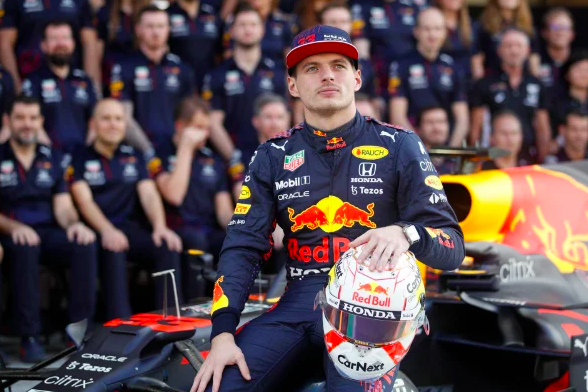 " title="Why does Red Bull own an F1 team? Because the company — which sells $7B+ of energy drinks a year — is a pure marketing firm (outsources all production).Its invested $2B+ into F1 but has gained multiples of that for the brand by "manufacturing history".Here’s a breakdownhttps://abs.twimg.com/emoji/v2/... draggable="false" alt="🧵" title="collectie" aria-label="Emoji: collectie">" class="img-responsive" style="max-width:100%;"/>
" title="Why does Red Bull own an F1 team? Because the company — which sells $7B+ of energy drinks a year — is a pure marketing firm (outsources all production).Its invested $2B+ into F1 but has gained multiples of that for the brand by "manufacturing history".Here’s a breakdownhttps://abs.twimg.com/emoji/v2/... draggable="false" alt="🧵" title="collectie" aria-label="Emoji: collectie">" class="img-responsive" style="max-width:100%;"/>

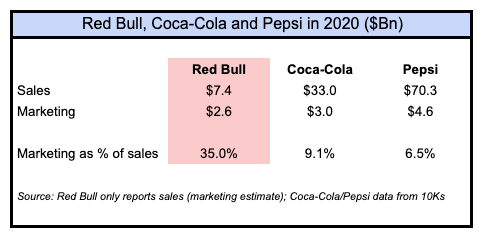
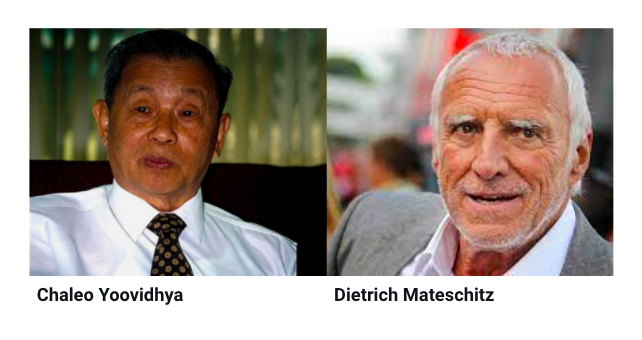
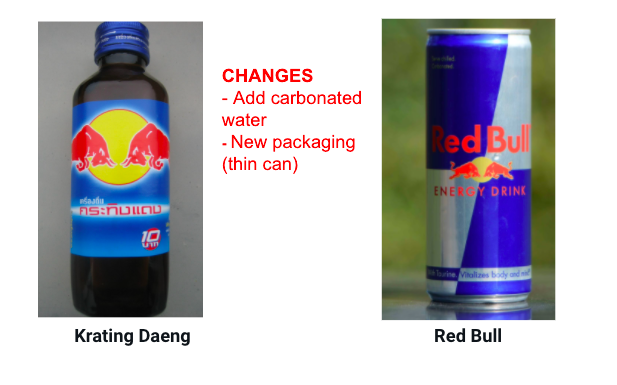
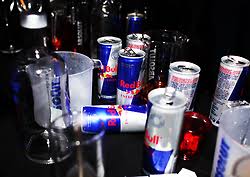


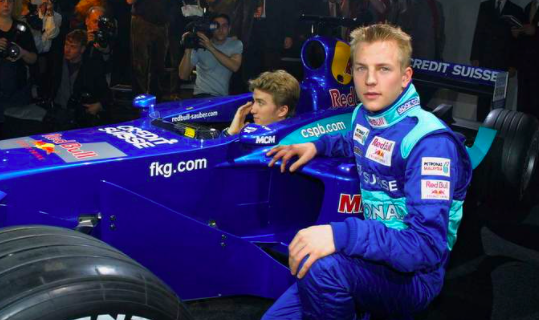
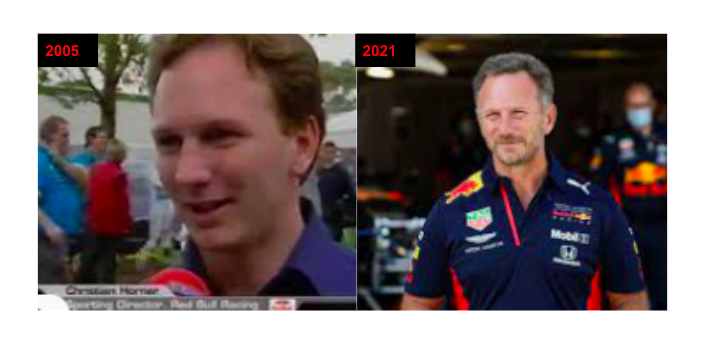
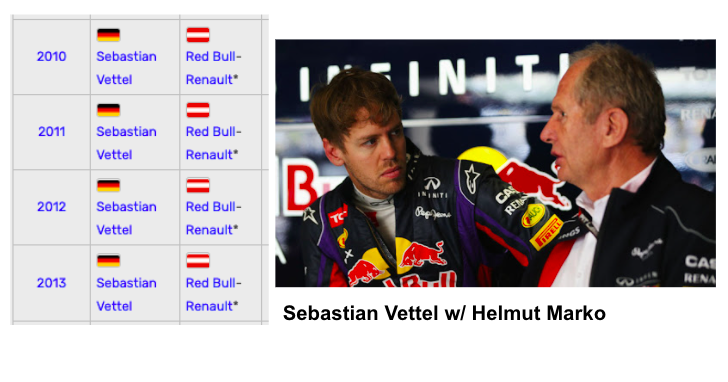
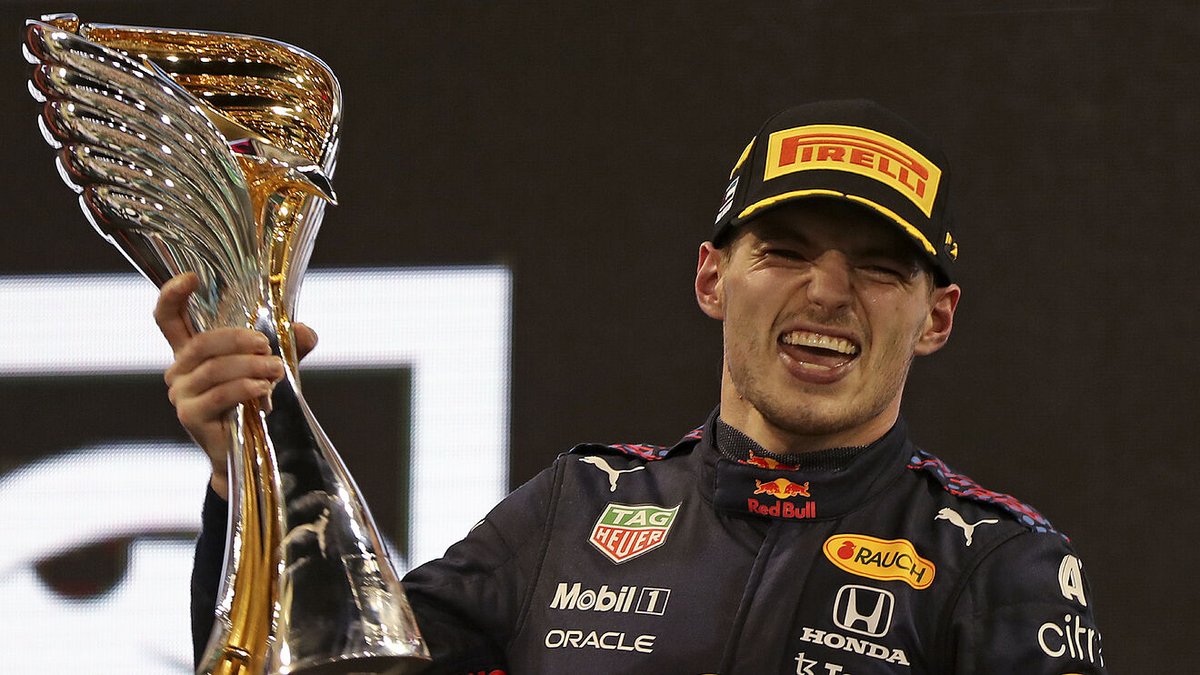
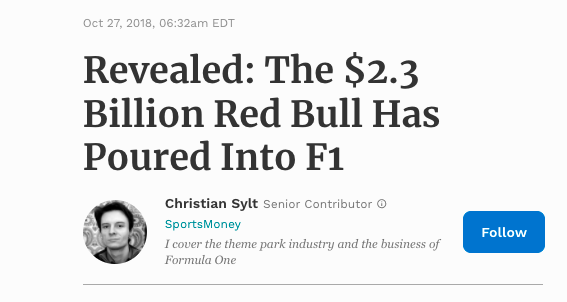
 Fandom is heritable through generationshttps://abs.twimg.com/emoji/v2/... draggable="false" alt="◻️" title="Middelgroot wit vierkant" aria-label="Emoji: Middelgroot wit vierkant">Winning creates mythology around producthttps://abs.twimg.com/emoji/v2/... draggable="false" alt="◻️" title="Middelgroot wit vierkant" aria-label="Emoji: Middelgroot wit vierkant">Constant exposure creates deep affection" title="12/ Manufacturing HistoryEven more than brand exposure, Red Bull Racing creates history, which ultimately reduces customer acquisition costs b/c:https://abs.twimg.com/emoji/v2/... draggable="false" alt="◻️" title="Middelgroot wit vierkant" aria-label="Emoji: Middelgroot wit vierkant">Fandom is heritable through generationshttps://abs.twimg.com/emoji/v2/... draggable="false" alt="◻️" title="Middelgroot wit vierkant" aria-label="Emoji: Middelgroot wit vierkant">Winning creates mythology around producthttps://abs.twimg.com/emoji/v2/... draggable="false" alt="◻️" title="Middelgroot wit vierkant" aria-label="Emoji: Middelgroot wit vierkant">Constant exposure creates deep affection" class="img-responsive" style="max-width:100%;"/>
Fandom is heritable through generationshttps://abs.twimg.com/emoji/v2/... draggable="false" alt="◻️" title="Middelgroot wit vierkant" aria-label="Emoji: Middelgroot wit vierkant">Winning creates mythology around producthttps://abs.twimg.com/emoji/v2/... draggable="false" alt="◻️" title="Middelgroot wit vierkant" aria-label="Emoji: Middelgroot wit vierkant">Constant exposure creates deep affection" title="12/ Manufacturing HistoryEven more than brand exposure, Red Bull Racing creates history, which ultimately reduces customer acquisition costs b/c:https://abs.twimg.com/emoji/v2/... draggable="false" alt="◻️" title="Middelgroot wit vierkant" aria-label="Emoji: Middelgroot wit vierkant">Fandom is heritable through generationshttps://abs.twimg.com/emoji/v2/... draggable="false" alt="◻️" title="Middelgroot wit vierkant" aria-label="Emoji: Middelgroot wit vierkant">Winning creates mythology around producthttps://abs.twimg.com/emoji/v2/... draggable="false" alt="◻️" title="Middelgroot wit vierkant" aria-label="Emoji: Middelgroot wit vierkant">Constant exposure creates deep affection" class="img-responsive" style="max-width:100%;"/>
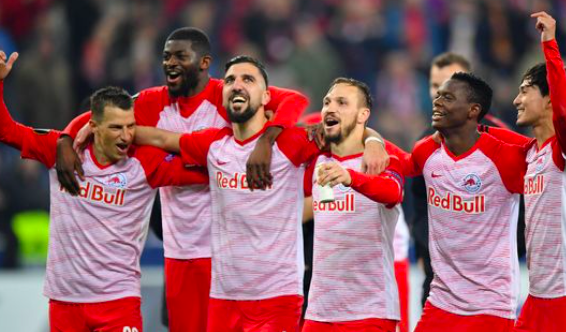 6 soccer teams (RB Leipzig, NY Red Bulls, RB Salzburg, RB Ghana, RB Brasil)https://abs.twimg.com/emoji/v2/... draggable="false" alt="◻️" title="Middelgroot wit vierkant" aria-label="Emoji: Middelgroot wit vierkant">2 F1 teams (RB Racing and Scuderia AlphaTauri)https://abs.twimg.com/emoji/v2/... draggable="false" alt="◻️" title="Middelgroot wit vierkant" aria-label="Emoji: Middelgroot wit vierkant"> Other (E-sports, hockey, sailing, skateboarding, NASCAR)" title="13/ A stable of sports teamsIn fact, Red Bull "manufactures history" across many sports: https://abs.twimg.com/emoji/v2/... draggable="false" alt="◻️" title="Middelgroot wit vierkant" aria-label="Emoji: Middelgroot wit vierkant">6 soccer teams (RB Leipzig, NY Red Bulls, RB Salzburg, RB Ghana, RB Brasil)https://abs.twimg.com/emoji/v2/... draggable="false" alt="◻️" title="Middelgroot wit vierkant" aria-label="Emoji: Middelgroot wit vierkant">2 F1 teams (RB Racing and Scuderia AlphaTauri)https://abs.twimg.com/emoji/v2/... draggable="false" alt="◻️" title="Middelgroot wit vierkant" aria-label="Emoji: Middelgroot wit vierkant"> Other (E-sports, hockey, sailing, skateboarding, NASCAR)">
6 soccer teams (RB Leipzig, NY Red Bulls, RB Salzburg, RB Ghana, RB Brasil)https://abs.twimg.com/emoji/v2/... draggable="false" alt="◻️" title="Middelgroot wit vierkant" aria-label="Emoji: Middelgroot wit vierkant">2 F1 teams (RB Racing and Scuderia AlphaTauri)https://abs.twimg.com/emoji/v2/... draggable="false" alt="◻️" title="Middelgroot wit vierkant" aria-label="Emoji: Middelgroot wit vierkant"> Other (E-sports, hockey, sailing, skateboarding, NASCAR)" title="13/ A stable of sports teamsIn fact, Red Bull "manufactures history" across many sports: https://abs.twimg.com/emoji/v2/... draggable="false" alt="◻️" title="Middelgroot wit vierkant" aria-label="Emoji: Middelgroot wit vierkant">6 soccer teams (RB Leipzig, NY Red Bulls, RB Salzburg, RB Ghana, RB Brasil)https://abs.twimg.com/emoji/v2/... draggable="false" alt="◻️" title="Middelgroot wit vierkant" aria-label="Emoji: Middelgroot wit vierkant">2 F1 teams (RB Racing and Scuderia AlphaTauri)https://abs.twimg.com/emoji/v2/... draggable="false" alt="◻️" title="Middelgroot wit vierkant" aria-label="Emoji: Middelgroot wit vierkant"> Other (E-sports, hockey, sailing, skateboarding, NASCAR)">
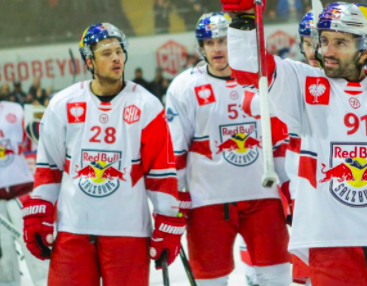 6 soccer teams (RB Leipzig, NY Red Bulls, RB Salzburg, RB Ghana, RB Brasil)https://abs.twimg.com/emoji/v2/... draggable="false" alt="◻️" title="Middelgroot wit vierkant" aria-label="Emoji: Middelgroot wit vierkant">2 F1 teams (RB Racing and Scuderia AlphaTauri)https://abs.twimg.com/emoji/v2/... draggable="false" alt="◻️" title="Middelgroot wit vierkant" aria-label="Emoji: Middelgroot wit vierkant"> Other (E-sports, hockey, sailing, skateboarding, NASCAR)" title="13/ A stable of sports teamsIn fact, Red Bull "manufactures history" across many sports: https://abs.twimg.com/emoji/v2/... draggable="false" alt="◻️" title="Middelgroot wit vierkant" aria-label="Emoji: Middelgroot wit vierkant">6 soccer teams (RB Leipzig, NY Red Bulls, RB Salzburg, RB Ghana, RB Brasil)https://abs.twimg.com/emoji/v2/... draggable="false" alt="◻️" title="Middelgroot wit vierkant" aria-label="Emoji: Middelgroot wit vierkant">2 F1 teams (RB Racing and Scuderia AlphaTauri)https://abs.twimg.com/emoji/v2/... draggable="false" alt="◻️" title="Middelgroot wit vierkant" aria-label="Emoji: Middelgroot wit vierkant"> Other (E-sports, hockey, sailing, skateboarding, NASCAR)">
6 soccer teams (RB Leipzig, NY Red Bulls, RB Salzburg, RB Ghana, RB Brasil)https://abs.twimg.com/emoji/v2/... draggable="false" alt="◻️" title="Middelgroot wit vierkant" aria-label="Emoji: Middelgroot wit vierkant">2 F1 teams (RB Racing and Scuderia AlphaTauri)https://abs.twimg.com/emoji/v2/... draggable="false" alt="◻️" title="Middelgroot wit vierkant" aria-label="Emoji: Middelgroot wit vierkant"> Other (E-sports, hockey, sailing, skateboarding, NASCAR)" title="13/ A stable of sports teamsIn fact, Red Bull "manufactures history" across many sports: https://abs.twimg.com/emoji/v2/... draggable="false" alt="◻️" title="Middelgroot wit vierkant" aria-label="Emoji: Middelgroot wit vierkant">6 soccer teams (RB Leipzig, NY Red Bulls, RB Salzburg, RB Ghana, RB Brasil)https://abs.twimg.com/emoji/v2/... draggable="false" alt="◻️" title="Middelgroot wit vierkant" aria-label="Emoji: Middelgroot wit vierkant">2 F1 teams (RB Racing and Scuderia AlphaTauri)https://abs.twimg.com/emoji/v2/... draggable="false" alt="◻️" title="Middelgroot wit vierkant" aria-label="Emoji: Middelgroot wit vierkant"> Other (E-sports, hockey, sailing, skateboarding, NASCAR)">
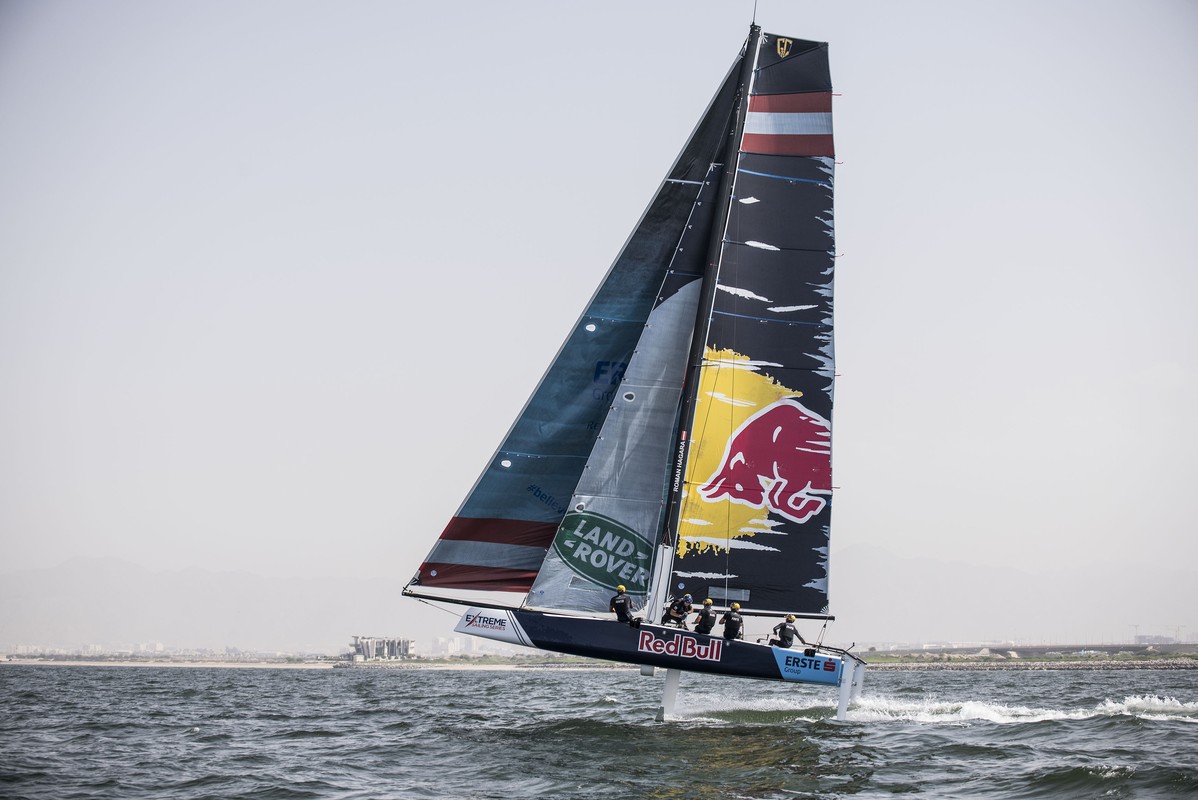 6 soccer teams (RB Leipzig, NY Red Bulls, RB Salzburg, RB Ghana, RB Brasil)https://abs.twimg.com/emoji/v2/... draggable="false" alt="◻️" title="Middelgroot wit vierkant" aria-label="Emoji: Middelgroot wit vierkant">2 F1 teams (RB Racing and Scuderia AlphaTauri)https://abs.twimg.com/emoji/v2/... draggable="false" alt="◻️" title="Middelgroot wit vierkant" aria-label="Emoji: Middelgroot wit vierkant"> Other (E-sports, hockey, sailing, skateboarding, NASCAR)" title="13/ A stable of sports teamsIn fact, Red Bull "manufactures history" across many sports: https://abs.twimg.com/emoji/v2/... draggable="false" alt="◻️" title="Middelgroot wit vierkant" aria-label="Emoji: Middelgroot wit vierkant">6 soccer teams (RB Leipzig, NY Red Bulls, RB Salzburg, RB Ghana, RB Brasil)https://abs.twimg.com/emoji/v2/... draggable="false" alt="◻️" title="Middelgroot wit vierkant" aria-label="Emoji: Middelgroot wit vierkant">2 F1 teams (RB Racing and Scuderia AlphaTauri)https://abs.twimg.com/emoji/v2/... draggable="false" alt="◻️" title="Middelgroot wit vierkant" aria-label="Emoji: Middelgroot wit vierkant"> Other (E-sports, hockey, sailing, skateboarding, NASCAR)">
6 soccer teams (RB Leipzig, NY Red Bulls, RB Salzburg, RB Ghana, RB Brasil)https://abs.twimg.com/emoji/v2/... draggable="false" alt="◻️" title="Middelgroot wit vierkant" aria-label="Emoji: Middelgroot wit vierkant">2 F1 teams (RB Racing and Scuderia AlphaTauri)https://abs.twimg.com/emoji/v2/... draggable="false" alt="◻️" title="Middelgroot wit vierkant" aria-label="Emoji: Middelgroot wit vierkant"> Other (E-sports, hockey, sailing, skateboarding, NASCAR)" title="13/ A stable of sports teamsIn fact, Red Bull "manufactures history" across many sports: https://abs.twimg.com/emoji/v2/... draggable="false" alt="◻️" title="Middelgroot wit vierkant" aria-label="Emoji: Middelgroot wit vierkant">6 soccer teams (RB Leipzig, NY Red Bulls, RB Salzburg, RB Ghana, RB Brasil)https://abs.twimg.com/emoji/v2/... draggable="false" alt="◻️" title="Middelgroot wit vierkant" aria-label="Emoji: Middelgroot wit vierkant">2 F1 teams (RB Racing and Scuderia AlphaTauri)https://abs.twimg.com/emoji/v2/... draggable="false" alt="◻️" title="Middelgroot wit vierkant" aria-label="Emoji: Middelgroot wit vierkant"> Other (E-sports, hockey, sailing, skateboarding, NASCAR)">
 6 soccer teams (RB Leipzig, NY Red Bulls, RB Salzburg, RB Ghana, RB Brasil)https://abs.twimg.com/emoji/v2/... draggable="false" alt="◻️" title="Middelgroot wit vierkant" aria-label="Emoji: Middelgroot wit vierkant">2 F1 teams (RB Racing and Scuderia AlphaTauri)https://abs.twimg.com/emoji/v2/... draggable="false" alt="◻️" title="Middelgroot wit vierkant" aria-label="Emoji: Middelgroot wit vierkant"> Other (E-sports, hockey, sailing, skateboarding, NASCAR)" title="13/ A stable of sports teamsIn fact, Red Bull "manufactures history" across many sports: https://abs.twimg.com/emoji/v2/... draggable="false" alt="◻️" title="Middelgroot wit vierkant" aria-label="Emoji: Middelgroot wit vierkant">6 soccer teams (RB Leipzig, NY Red Bulls, RB Salzburg, RB Ghana, RB Brasil)https://abs.twimg.com/emoji/v2/... draggable="false" alt="◻️" title="Middelgroot wit vierkant" aria-label="Emoji: Middelgroot wit vierkant">2 F1 teams (RB Racing and Scuderia AlphaTauri)https://abs.twimg.com/emoji/v2/... draggable="false" alt="◻️" title="Middelgroot wit vierkant" aria-label="Emoji: Middelgroot wit vierkant"> Other (E-sports, hockey, sailing, skateboarding, NASCAR)">
6 soccer teams (RB Leipzig, NY Red Bulls, RB Salzburg, RB Ghana, RB Brasil)https://abs.twimg.com/emoji/v2/... draggable="false" alt="◻️" title="Middelgroot wit vierkant" aria-label="Emoji: Middelgroot wit vierkant">2 F1 teams (RB Racing and Scuderia AlphaTauri)https://abs.twimg.com/emoji/v2/... draggable="false" alt="◻️" title="Middelgroot wit vierkant" aria-label="Emoji: Middelgroot wit vierkant"> Other (E-sports, hockey, sailing, skateboarding, NASCAR)" title="13/ A stable of sports teamsIn fact, Red Bull "manufactures history" across many sports: https://abs.twimg.com/emoji/v2/... draggable="false" alt="◻️" title="Middelgroot wit vierkant" aria-label="Emoji: Middelgroot wit vierkant">6 soccer teams (RB Leipzig, NY Red Bulls, RB Salzburg, RB Ghana, RB Brasil)https://abs.twimg.com/emoji/v2/... draggable="false" alt="◻️" title="Middelgroot wit vierkant" aria-label="Emoji: Middelgroot wit vierkant">2 F1 teams (RB Racing and Scuderia AlphaTauri)https://abs.twimg.com/emoji/v2/... draggable="false" alt="◻️" title="Middelgroot wit vierkant" aria-label="Emoji: Middelgroot wit vierkant"> Other (E-sports, hockey, sailing, skateboarding, NASCAR)">
